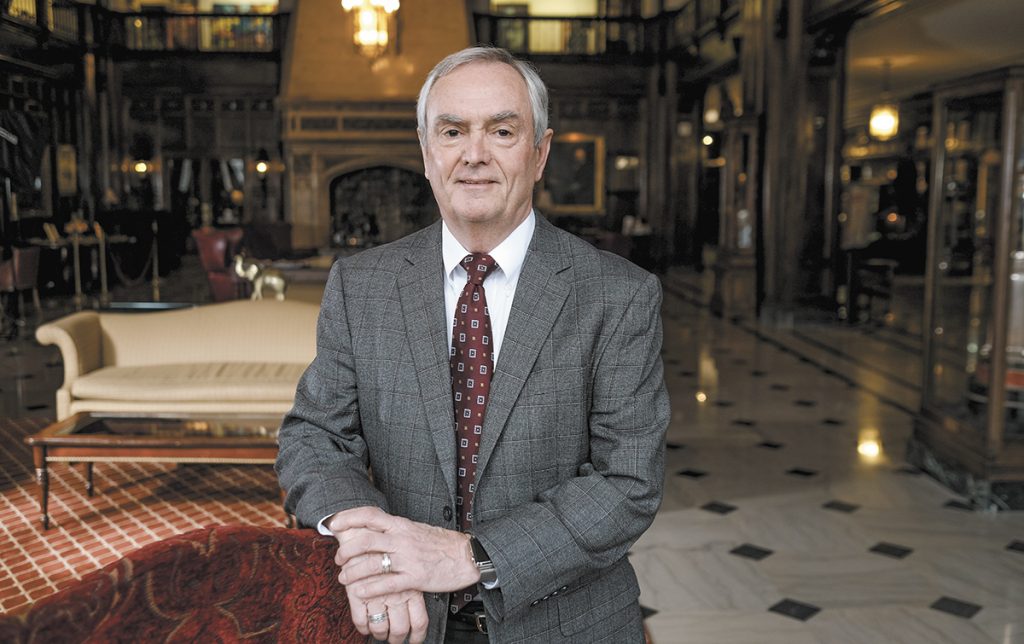Subscriber Benefit
As a subscriber you can listen to articles at work, in the car, or while you work out. Subscribe NowYou could say Thomas Henry wrote the book on intellectual property law in Indiana. His volume, “Overview of Patents, Trademarks, Copyrights and Trade Secrets in the Business Setting,” has been a go-to resource for Hoosier employers since commissioned by the Indiana Chamber of Commerce. Not only a master of his practice, Henry has also generously shared his expertise, educating lawyers in training for many years by teaching IP law courses at his alma mater. He also has been a leader in the community, serving as chairman of the Indianapolis Zoo’s Zoobilation fundraiser and of Indy Jazz Fest, among other endeavors.
As a leader in intellectual property law in Indiana, what do you think makes a great IP lawyer?
A grounding in science or engineering is a basic requirement for any patent attorney. A “good” patent attorney has a genuine interest in continuing to learn about new concepts in technology. A “great” patent attorney shares the client’s passion for his/her inventive contributions.
What drew you personally to IP law, and to the firm where you have made your career?
I was totally impressed by Harold “Hal” Woodard, who taught the patent law course while I was attending law school in Indianapolis. Mr. Woodard was an iconic figure in the field of intellectual property law. Dean of students Kent Frandsen stopped me in the hall one Wednesday and said he was looking for me to mention a job opening at Mr. Woodard’s firm. I interviewed with the firm the next day, was offered the job on Friday and started the following Monday. What a great “job” being able to work on a daily basis with smart and enthusiastic people who are willing to share the excitement of their latest developments.
Why has bar membership and leadership been important to you over the years?
It has been a privilege to serve both the Indianapolis and Indiana State bar associations and their respective foundations. I benefited greatly from the mentoring I received through these associations, and I made many lifelong friends through bar activities. Lawyers are smart, engaging and, quite simply, enjoyable to be around.
What do you most like to do when you have free time?
I enjoy what I would term adventure travel. My wife Sandy and I have summited Kilimanjaro together and made a number of treks to Machu Picchu and the Swiss and Austrian Alps. Reaching the summit of Aconcagua in Peru, the highest mountain outside of the Himalayas at 22,841 feet, was my biggest and most satisfying challenge.
If you hadn’t pursued a legal career, what do you imagine you might be doing?
I like to imagine myself as a ski instructor in Colorado, but I guess that really was never in the cards. As it turns out, I can’t imagine anything else that I might have done that could have been more satisfying than my career in patent law.
What’s a great piece of advice you’ve received that makes a personal difference?
My favorite piece of advice came from an employee at Einstein Bros. Bagels. After ordering a way-too-complicated bagel, I started to comment: “You know what they say, the customer is always … .” But before I could finish, he responded: “No, the customer is not always right, but the customer is always the customer.” The point is that a lawyer, as much or more than anyone else, needs to take the client’s perspective to heart in order to serve the client effectively.
What advice would you give your younger self?
Always keep family, friends and work in perspective — and in that order. And be careful on those mountains.
What’s the best training for someone who aspires to be an IP lawyer?
Good communication skills are important in all fields of law, but particularly so in patent law. Patent lawyers spend a great deal of time choosing exactly the right words to define an invention, and then other patent lawyers spend even more time trying to pick those words apart. Writings need to be thorough, precise and persuasive, and they need to capture the “story” behind the inventive advancement in the art.
Who is someone who mentored you, and what did you learn from them?
I started in the practice of law at a relatively young 23 years of age. As a result, I benefited greatly from the qualities and lessons instilled in me by the more senior members of the firm. Collectively they taught me to have high standards both personally and professionally, to relate to others in a positive way, to enjoy family and friends, and to give back to the profession and the community.
What’s something you’ve learned from teaching others?
When Hal Woodard stepped down from teaching, I took over his position and taught intellectual property law and patent law to more than 1,000 Indianapolis law students over a period of 20-plus years. I learned that if you know how to do something, then you can do it. But if you want to teach it to someone else, then you have to understand it.•
Read more Leadership in Law profiles.
Please enable JavaScript to view this content.

